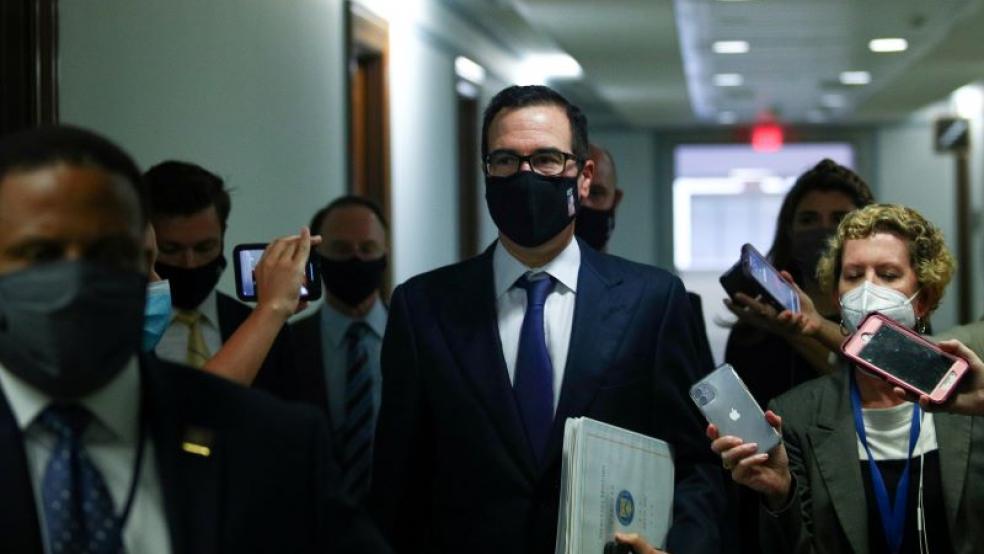Republican efforts to develop a coherent plan for the next coronavirus relief bill got off to a rough start Tuesday, with lawmakers and the White House unable to agree on even basic elements of the GOP proposal.
At a lunch meeting between lawmakers and officials from the Trump administration, disagreements reportedly arose on policy details such as a proposed payroll tax cut and additional funding for the Centers for Disease Control and Prevention, as well as over the ultimate size of the relief package.
Deadline looming: Earlier Tuesday, House Speaker Nancy Pelosi (D-CA) said she hopes lawmakers can reach a deal by the end of next week, but Minority Leader Kevin McCarthy (R-CA) said he doubted the legislation would get done in July, instead citing the first week of August as a target date. Senate Majority Leader Mitch McConnell (R-KY) reportedly laughed in response to a question about whether the bill could pass by the end of next week, the target date set by Treasury Secretary Steven Mnuchin.
Saying the Senate Republicans’ version of the relief bill will be released “very soon,” McConnell provided some details on the still-developing proposal. He said it would include $105 billion for schools to help cover the cost of reopening in the middle of a pandemic; another round of stimulus check for individuals; reimbursement for businesses for coronavirus-related expenses, such as cleaning and the installation of plexiglass barriers; and another round of Paycheck Protection Program loans for small businesses.
But Republicans still face plenty of internal differences, and they reportedly made little progress Tuesday in bridging those disagreements., prompting some “crowing” by Democratic leaders. “Republicans are in complete disarray,” Senate Minority Leader Chuck Schumer (D-NY) said. “Totally incompetent. Totally in disarray. Totally at war with one another.”
Differences on spending: Mnuchin and the White House had indicated that the administration was looking to keep the cost of the package around $1 trillion, but The Washington Post reports that the Treasury secretary “had abandoned that mantra” by Tuesday. “I think we’re going to spend what we need to spend, and we’re going to make sure we don’t spend more than that,” Mnuchin said. Other Republicans still object to the idea of increased spending. “What in the hell are we doing,” an angry Sen. Ted Cruz (R-TX) reportedly said in response to proposals to boost spending in the bill.
Major hurdles ahead: Republican chaos aside, the overall discussion far suggests that the Democratic-controlled House, the Republican-controlled Senate and the Trump administration all agree the U.S. needs another substantial round of relief and stimulus. But the parties are nowhere near agreement when it comes to many of the specifics. Here’s a rundown of key sticking points via Amber Phillips of The Washington Post.
Unemployment benefits: The $600 per week boost in benefits expires in just a few days, all but guaranteeing a lapse in the program for millions of Americans. Democrats want to continue the program at the $600 level, while Republicans have signaled they want to cut the weekly payment by several hundred dollars.
Payroll tax cut: President Trump is pushing for a payroll tax cut, but Democrats and some Republicans, citing the cost, the optics of cutting the source of Social Security funding and the fact that such a cut would do nothing for the unemployed, are opposed to the idea. Bowing to Trump, McConnell may include a deferral of payroll taxes in the proposal, though few think it will make it into the final bill.
Stimulus checks: There appears to be agreement over including another round of stimulus checks in the relief bill, but McConnell has indicated the payout should be limited to households earning less than $40,000.
Testing and tracing: Lawmakers from both parties want to include additional funds for testing and tracing programs at the state level, but the Trump administration was reportedly trying to block the effort over the weekend. The Washington Post reported Tuesday, however, that the White House has changed course and will not oppose a Republican proposal to provide $25 billion for the effort.
Aid for states and cities: Democrats want to provide $1 trillion to state and local governments reeling from falling tax revenues and rising social welfare costs, but Republicans have little interest in anything close to that level of support, saying they don’t want to bail out badly run states.
School reopening: Trump and administration officials are pushing hard to open schools in the fall, and Republicans may defer to those demands by making federal educational aid contingent on some degree of reopening at the state and local level.
Liability shield: McConnell has repeatedly said businesses must be given extra protection from lawsuits related to potential coronavirus illnesses and deaths, but Democrats insist on additional aid for workers.




